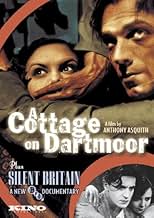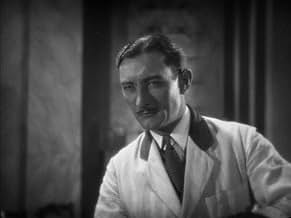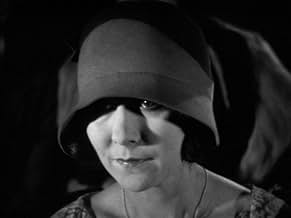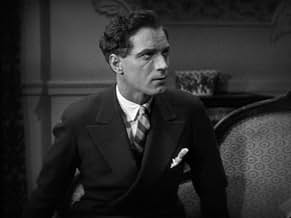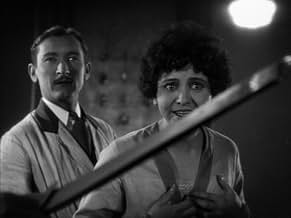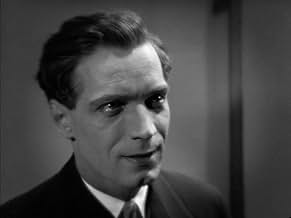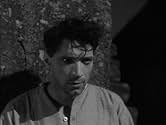NOTE IMDb
7,5/10
1,3 k
MA NOTE
Ajouter une intrigue dans votre langueA former barber escapes from a high security prison. Flashback story of an escape from the lonely, high-security Dartmoor Prison.A former barber escapes from a high security prison. Flashback story of an escape from the lonely, high-security Dartmoor Prison.A former barber escapes from a high security prison. Flashback story of an escape from the lonely, high-security Dartmoor Prison.
- Réalisation
- Scénario
- Casting principal
Hans Adalbert Schlettow
- Harry - a Dartmoor Farmer
- (as Hans Schlettow)
Anthony Asquith
- Bespectacled Man in Cinema
- (non crédité)
Judd Green
- Customer
- (non crédité)
Avis à la une
Anthony Asquith is best known for straightforward film-making in the so-called British literary tradition which served him particularly well in stage-to-screen adaptations of G. B. Shaw & Terrence Rattigan. Letting the writer function as auteur doesn't win you critical kudos, but films as fine as PYGMALION/'38 and THE BROWNING VERSION/'51 don't just 'happen.' Even so, it's fun to watch the young Asquith show off, even needlessly, on late silents like this & UNDERGROUND/'28, also out on DVD. You can all but hear him parsing the latest Russian or German import just screened at his CineClub. There's some strikingly fast montage work and psychological P.O.V. stuff (even a shock-flash of red tinting as in the original prints of Hitchcock's SPELLBOUND/'45), but the main influence is UFA studios with their posh camera moves, rich visual texture, expressionist acting, shadowy lighting & diagonal slashes The opening works best as Swedish actor Uno Henning (in his only British role, he's an intriguing mix of Buster Keaton & Conrad Veidt) breaks out of prison in search of revenge. The story flashes back to detail a rather commonplace love triangle that gives Asquith plenty of space for his set pieces (a visit to the cinema, a very close shave, et al.) which tend to run on a bit too long. But no matter, it's all ravishing to watch and if the characterizations never quite add up, the visual touches are worth the stretch.
From time to time, it is very laudable for this German count to re-watch some of those silent films of his aristocratic youth. Overall, this in order to check if the passage of time has positively or negatively influenced his recollection of the remarkable aspects of such films. That's not to mention that fortunately many of those films after such long time are now cleaned and restored -- nothing in common with those rotten and blurred nitrates that are stored at this Herr Graf's gloomy cellar that necessarily need an extra pair of monocles each time that they are shown at the Schloss theatre.
This time such advisable aristocratic and nostalgic film habits had excellent artistic results. That's because after 70 years from its official release, "A Cottage On Dartmoor", a film directed by Herr Anthony Asquith, preserves intact its many and excellent virtues. The perfect word that summarizes the merits of that British film: virtuosity.
Herr Anthony Asquith skillful film direction begins as the films starts. It introduces a convict that escaped from prison running away along Dartmoor meadows. With the sole purpose of revenge, he tries to find the girl that causes him imprisonment; when finally he finds her, a fascinating flashback starts.
A superb display of film technique can be seen in the film. There are such as perfect images ( Expressionism influences are obvious in the film, in its obscure and visual conception ) concatenations or fascinating visual metaphors ( the use of the camera is astounding: remarkable and imaginative camera angles that scrutinizes the tormented soul and evil intentions of the main character of the film ). It depicts an intriguing, thrilling and original story. A barber, Joe ( Herr Uno Henning ) falls in love with a manicurist, Sally ( Dame Norah Baring ) in the same place where both work. Joe is rejected by her and doesn't accept that ultimately Sally loves a client, Harry ( Herr Hans Adalbert Schlettow ). Consumed by jealousy, tries to murder Harry.
It has a perfect "tempo" in order to explain and show such a tormented love story that will finish with a poetic, sorrowful ending. Only one thing is lacking in seeing the film and is Dame Norah Baring's performance. Probably she is so stiff, inexpressive and frigid due to the abuse of the use of tea -- that awful beverage that usually is drunk by commoners and even eccentric aristocrats in the perfidious Albion. But that's a minor flaw that doesn't damage excessively the excellent artistic merits of such remarkable film.
And now, if you'll allow me, I must temporarily take my leave because this German Count must go to a decadent soirée pretty well-combed.
Herr Graf Ferdinand Von Galitzien http://ferdinandvongalitzien.blogspot.com/
This time such advisable aristocratic and nostalgic film habits had excellent artistic results. That's because after 70 years from its official release, "A Cottage On Dartmoor", a film directed by Herr Anthony Asquith, preserves intact its many and excellent virtues. The perfect word that summarizes the merits of that British film: virtuosity.
Herr Anthony Asquith skillful film direction begins as the films starts. It introduces a convict that escaped from prison running away along Dartmoor meadows. With the sole purpose of revenge, he tries to find the girl that causes him imprisonment; when finally he finds her, a fascinating flashback starts.
A superb display of film technique can be seen in the film. There are such as perfect images ( Expressionism influences are obvious in the film, in its obscure and visual conception ) concatenations or fascinating visual metaphors ( the use of the camera is astounding: remarkable and imaginative camera angles that scrutinizes the tormented soul and evil intentions of the main character of the film ). It depicts an intriguing, thrilling and original story. A barber, Joe ( Herr Uno Henning ) falls in love with a manicurist, Sally ( Dame Norah Baring ) in the same place where both work. Joe is rejected by her and doesn't accept that ultimately Sally loves a client, Harry ( Herr Hans Adalbert Schlettow ). Consumed by jealousy, tries to murder Harry.
It has a perfect "tempo" in order to explain and show such a tormented love story that will finish with a poetic, sorrowful ending. Only one thing is lacking in seeing the film and is Dame Norah Baring's performance. Probably she is so stiff, inexpressive and frigid due to the abuse of the use of tea -- that awful beverage that usually is drunk by commoners and even eccentric aristocrats in the perfidious Albion. But that's a minor flaw that doesn't damage excessively the excellent artistic merits of such remarkable film.
And now, if you'll allow me, I must temporarily take my leave because this German Count must go to a decadent soirée pretty well-combed.
Herr Graf Ferdinand Von Galitzien http://ferdinandvongalitzien.blogspot.com/
COTTAGE ON DARTMOOR: an expressionistic and claustrophobic account of sexual obsession and jealousy, very Hitchockian in the way it deals with the resulting crescendo of suspense, especially in connection with a key throat-cutting in a barber's chair incident. Asquith was a director who grew stodgy as his career entered into the sound era, viz his terribly British adaptions of Rattigan, but the present film (1929) is rather an eye opener. One standout scene is set within a cinema, partly a comment on the imminent and creatively burdensome coming of clunky sound, and which contains an extended eye opening use of editing, cutting about within an audience as the beady-eyed boy friend watches his victims - a bravura sequence which ought to be much better known to cineastes.
Uno Henning escapes from Dartmoor Prison and makes it to a small cottage where he confronts Norah Baring. We see in flashback that he worked in a barber shop and had a crush on Baring. After she (kind of) unintentionally leads him on, he discovers that she plans on marrying customer Hans Adalbert Schlettow. Bad things happen.
The last of four silent films made by Anthony Asquith, it was made so much on the cusp of talking films that the characters go see one in the film. It's a striking visual film with strong expressionist elements and odd, dynamic editing. It's also about 15 minutes too long.
Asquith cameos as a customer in the quite long movie theater scene.
The last of four silent films made by Anthony Asquith, it was made so much on the cusp of talking films that the characters go see one in the film. It's a striking visual film with strong expressionist elements and odd, dynamic editing. It's also about 15 minutes too long.
Asquith cameos as a customer in the quite long movie theater scene.
Stylish and tense melodrama which features an opening scene where a man who has just escaped from prison is seen crossing the stark and gloomy moors, the sky darkened by black clouds, and not much more to be seen than a few wandering cows and a dark, bare tree. A woman cares for her baby at a lonely, isolated cottage, the man slithers in and confronts her and - she knows him! Now in flashback we see the background story of these two, Joe and Sally, co-workers in a barber shop where he gives men a shave and a haircut while she manicures their nails and gives the customers flirtatious smiles. This prompts more than just jealousy in this man - he pursues her, she doesn't really seem to like him that much but does agree to go out with him and they spend an evening together at her boarding-house where numerous well-meaning, slightly interfering old-timers seem to live (and he gets some pretty scary expressions on his face in what seems to be his desperation to kiss her). When she agrees to go see a "talkie" with a certain male customer, Joe turns stalker as he sneaks into the theater, secretly plants himself in the row behind them, and in an amazingly photographed scene shot using rapid-paced editing, we never see the film they are watching - instead the camera cuts between audience members plus Sally reacting as they watch the film, the orchestra playing, and Joe - who is not watching the film at all, but rather he's glaring in a steady gaze at Sally and her "date" in front of him.
This is a really excellent, well done film featuring loads of interesting cinematography - softly filtered lighting and shadowy scenes, facial close-ups, and lots of fast cutting. The guard who discovers Joe's escape is seen mainly in shadows against the cell walls, the menacing face of the convict as the camera quickly zooms in to show his face as the woman recognizes him, Joe sharpening his razor, quickly cut between two gossiping female co-workers, as he contemplates murder! The Kino DVD of this features a great looking black and white print and nicely done piano score that helps enhance the tension in the film. A great silent film, well worth seeing.
This is a really excellent, well done film featuring loads of interesting cinematography - softly filtered lighting and shadowy scenes, facial close-ups, and lots of fast cutting. The guard who discovers Joe's escape is seen mainly in shadows against the cell walls, the menacing face of the convict as the camera quickly zooms in to show his face as the woman recognizes him, Joe sharpening his razor, quickly cut between two gossiping female co-workers, as he contemplates murder! The Kino DVD of this features a great looking black and white print and nicely done piano score that helps enhance the tension in the film. A great silent film, well worth seeing.
Le saviez-vous
- GaffesJoe's coworker reaches down to pick up the movie tickets with his right hand, but the close-up shows his left hand grabbing them.
- ConnexionsFeatured in Loin de Hollywood - L'art européen du cinéma muet (1995)
Meilleurs choix
Connectez-vous pour évaluer et suivre la liste de favoris afin de recevoir des recommandations personnalisées
Détails
- Durée
- 1h 28min(88 min)
- Couleur
- Mixage
- Rapport de forme
- 1.20 : 1
Contribuer à cette page
Suggérer une modification ou ajouter du contenu manquant

